Public schooling monopolists such as the President of the American Federation of Teachers, Randi Weingarten, argue that private school choice programs undermine our democratic society. One of the frequently made fundamental arguments is that, if given the opportunity to do so, self-interested individual families would choose a “less-than-socially optimal” level of schooling since education may be a merit good.
In other words, if my children receive an education, the rest of society benefits from the transaction without having to pay for it directly. After all, other members of society will benefit if my children grow up to be well-informed voters and law-abiding citizens. The conclusion made by some economists is that the government ought to be able to force the rest of society – the free-riders – to subsidize schooling so that the collective could reach some “socially optimal” level of education.
However, such a conclusion assumes that having a more educated populace is the only externality associated with traditional schooling. In order to better understand the overall effect, I have created a list of possible positive and negative externalities associated with government schooling.
Positive Externalities:
- A more educated citizenry – the rest of society benefits when they have educated people to interact with. Also, democracy might function more effectively with highly educated and informed voters.
- Obedience – public schools were originally designed to create more obedient citizens. If a person is more obedient to the state, they may be less likely to break the law. As a result, third parties benefit from not having their property damaged or stolen.
Negative Externalities:
- A less educated citizenry – third parties are harmed if the compulsory levels of schooling do not maximize children’s education levels. After all, schooling is but one channel to achieve an education, and government schools do not have an incentive to provide children with optimal educational experiences.
- Obedience – if citizens are trained to be obedient, they may be less likely to invent technologies that benefit the rest of society. In addition, obedient employees may be less productive if their job requires them to think on their feet.
- Legitimized coercion through voting – the voting booth allows advantaged groups to exercise coercion over less fortunate members of society. Politically powerful groups can mobilize and extract resources from third parties, producing, at best, a zero-sum game.
- Opportunity costs of the political process – citizens must use excessive amounts of time and effort in order to become politically knowledgeable about various educational policies. These scarce resources could be more efficiently allocated towards generating an income or spending time strengthening bonds within the family.
- Inefficiency – government schools do not have an incentive to spend taxpayer resources efficiently. Consequently, we have observed public school spending increase substantially without discernible effects on observed student outcomes.
These expected externalities are demonstrated in table 1 below:
So is government schooling a merit good?
It certainly doesn’t seem like it if we consider all relevant externalities. Indeed, if I had to guess the sign of the net externality, I would argue that it is more likely to be negative overall. Nonetheless, since all of these positive and negative externalities are uncertain and likely to be very large in magnitude, I do not believe it is even possible to accurately calculate the sign of the net externality.
Rather than attempt to reach some imaginary socially optimal level of schooling, we ought to acknowledge that externalities exist in education, but that government intervention likely leads to more negative effects than it eradicates. Instead, we can improve overall social welfare by eliminating much of the negative externalities produced by government involvement in the education system.

